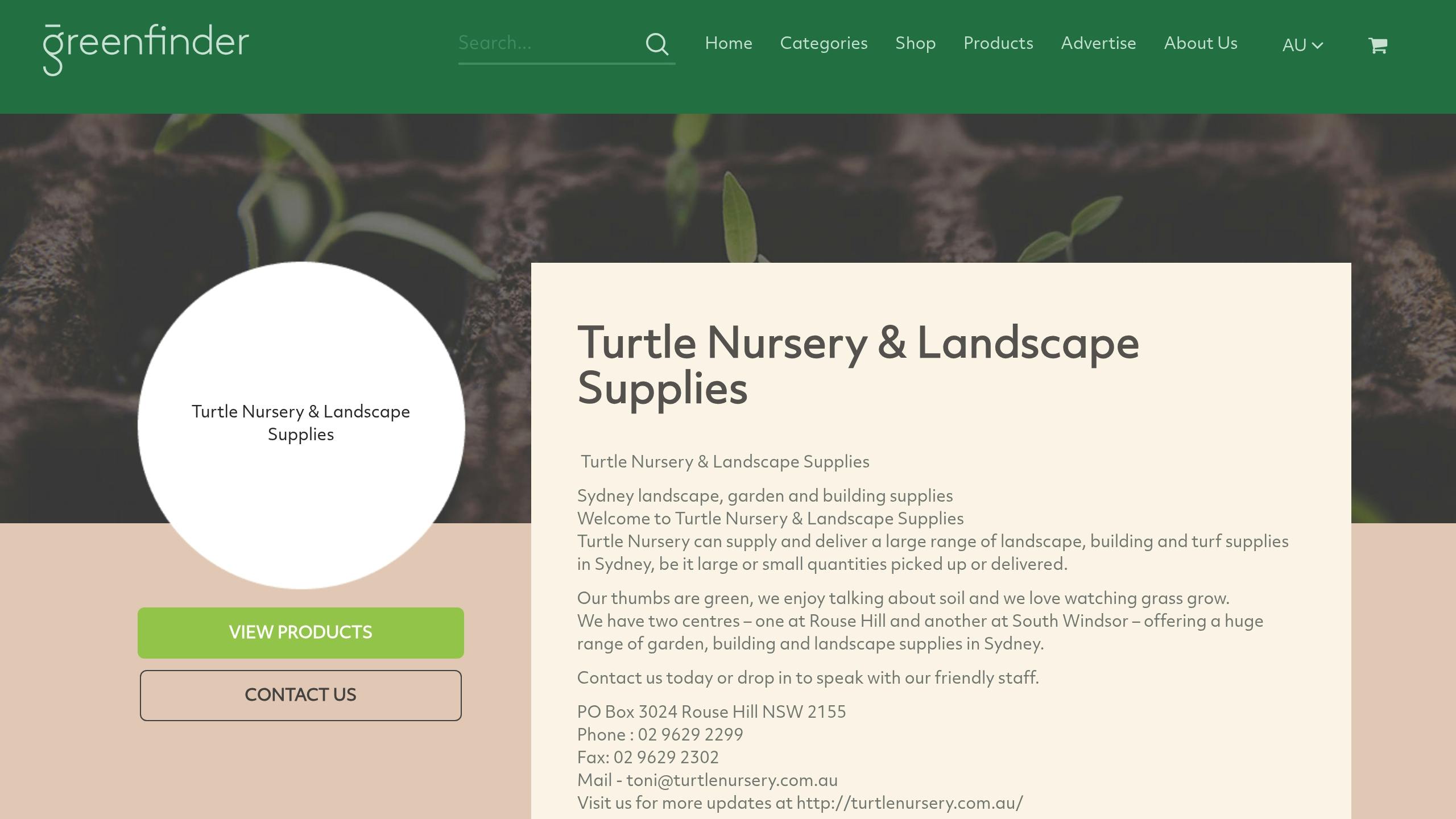Mulching is a simple yet powerful gardening practice that can transform your garden's health and resilience. Here's why it matters:
- Saves Water: Reduces soil water loss by up to 60% and cuts water needs by as much as 70%.
- Stops Weeds: Blocks sunlight to prevent weeds from sprouting, reducing maintenance.
- Improves Soil: Organic mulch enriches soil as it breaks down, boosting fertility and structure.
- Regulates Soil Temperature: Protects plant roots from extreme heat or cold.
Best Mulch Types for Australian Gardens:
- Coarse Mulch: Retains water and suppresses weeds.
- Composted Mulch: Enhances soil health with nutrients.
- Bark/Wood Chips: Ideal for native plants and long-lasting.
Quick Tip: Apply a 5–7 cm layer in late spring to early summer for the best results. Keep mulch away from plant stems to avoid rot. Whether you're battling Australia's heat or maintaining a city garden, mulching is the key to thriving plants and water conservation.
Main Mulching Benefits
Saving Water
Mulch plays a key role in conserving water, especially in Australia's dry climate. Acting as a protective layer, it reduces evaporation and keeps the soil moist. Sophie Thomson, Presenter, highlights this by saying:
"Mulch stops the top of the soil from drying out, reducing water loss by up to 60 per cent."
This moisture retention encourages deeper root systems, helping plants endure drought conditions.
Stopping Weeds
Mulch also helps control weeds by blocking sunlight, which prevents them from sprouting. This reduces the need for constant weeding and minimizes competition for resources. Jason, a Bunnings Team Member, shares:
"Mulch is certainly one of a gardener's most valuable tools. It blocks weeds from resprouting, keeps roots cool in the heat of summer and provides a clean, organised aesthetic that makes it easier to navigate around your plants."
For the best results, apply a 5-10 cm layer of mulch to suppress weeds effectively.
Improving Soil
Organic mulch does more than just control moisture and weeds - it breaks down over time, enriching sandy soils and supporting the growth of beneficial microorganisms that improve soil health.
Managing Soil Temperature
Mulch acts as an insulator, protecting plant roots from extreme temperature swings. A 70 mm layer is ideal, as it allows water to penetrate while maintaining stable soil temperatures .
Picking Mulch Types
Natural vs Synthetic Mulch
When deciding on mulch, you’ll need to choose between natural and synthetic options, depending on your garden's needs. Natural mulches, like wood chips, bark, and straw, are organic materials that break down over time, enriching your soil in the process. On the other hand, synthetic mulches, such as rubber, rocks, and landscape fabric, are more durable and don’t decompose.
| Mulch Type | Benefits | Maintenance | Lifespan |
|---|---|---|---|
| Natural | Improves soil health and attracts helpful organisms | Requires occasional replenishment | 1–2 years |
| Synthetic | Low upkeep and maintains appearance | Usually installed once | 3+ years |
Your local climate plays a big role in making the right mulch choice. Let’s take a closer look at how climate impacts your decision.
Mulch for Different Climates
Australia’s climate varies widely, from tropical conditions in the north to cooler, temperate zones in the south. These differences should guide your mulch selection.
In hot, dry regions, mulches like cypress, pine bark, or eucalyptus are excellent choices. They retain moisture well and can handle intense sunlight. Eucalyptus mulch is especially suited for bushland areas and lasts around two years .
For humid climates, consider ANL's Forest Fines or Forest Blend, which work well on slopes by staying in place . Hardwood chips and cypress mulch are also good options, lasting up to three years before needing replacement .
"Mulch does much more than make your garden look neat; it acts as a shield, protecting your soil and plant roots from the sweltering summer heat and preventing moisture loss during those long, hot days." – Borst Landscape & Design
Mulch for City Gardens
Urban gardeners face unique challenges, such as limited space and container setups, which require some adjustments to standard mulch practices.
In raised beds or containers, finer mulch is ideal because it breaks down faster . Apply a 2–3 inch layer, but leave some space around plant stems to avoid moisture buildup . For a polished look, color-enhanced mulches like red wood chips or midnight mulch are great choices and can last up to three years .
For pathways, larger hardwood mulch is effective for controlling erosion and weeds . Pine bark mulch is another option for formal gardens, offering a neat and uniform appearance .
Mulch Application Guide
How to Spread Mulch
Start by preparing the garden bed: clear away debris, tidy up plants, and remove any weeds. If the soil is dry, water it before you begin.
Here’s how to spread mulch effectively:
- Gather your tools: You'll need a wheelbarrow, shovel, rake, and gardening gloves.
- Check soil moisture: Ensure the soil is damp before applying mulch.
- Distribute mulch: Place small piles of mulch in several spots around the bed.
- Spread it out: Use your hands or a rake to create a uniform layer that's 2–4 inches thick.
- Keep it off plant stems: Make sure the mulch doesn’t touch the stems of plants to avoid rot.
After applying the mulch, check it regularly to ensure it remains effective.
"Both compost and mulch are key for a thriving garden and landscape but there are major differences between the two. In fact, using them interchangeably might negatively affect your garden soil and your plants." - Nadia Hassani, Penn State Master Gardener
Mulch Upkeep
To keep your garden thriving, maintain the mulch layer throughout the year. How often you need to add more depends on the type of mulch and your local conditions. Organic mulches typically need refreshing every 4–6 weeks during the growing season .
| Season | Maintenance Task | Purpose |
|---|---|---|
| Spring | Add a fresh layer | Get the garden ready for growth |
| Summer | Monitor mulch depth | Help retain soil moisture |
| Fall | Replenish the layer | Provide extra protection for winter |
| Winter | Check coverage | Ensure soil stays protected |
Mulch and Other Garden Methods
Combine mulch with other gardening strategies for better results:
- Composting: Apply compost first to enrich the soil, then cover it with mulch. This combo boosts soil quality while helping with moisture retention and weed control .
- Water Conservation: Mulching can reduce water usage by 20–25%. Young trees, in particular, may need up to 54% less water .
- Erosion Prevention: Mulch acts as a protective barrier, reducing soil erosion .
sbb-itb-28a8941
Summary and Tips
Main Points
Mulch plays a key role in maintaining healthy gardens in Australia. Here’s why it matters:
- Cuts down watering needs by about 60%
- Helps keep soil temperatures steady, shielding roots from extreme conditions
- The right type of mulch can improve soil quality and fertility
| Mulch Type | Best For | Key Benefits |
|---|---|---|
| Organic (bark, wood chips) | General gardens | Boosts soil structure and adds nutrients |
| Straw-based | Vegetables, herbs | Retains moisture effectively |
| Leaf mulch | Native gardens | Decomposes naturally and is locally sourced |
| Living mulch | Slopes, ornamental beds | Controls erosion and adds visual appeal |
These basics will help you make the most of your first mulch application.
Getting Started
- Opt for organic mulch, well-suited for Australian gardens
- Apply it before the dry season hits
- Spread a 5–7 cm layer to block weeds and improve soil aeration
Tips for Better Results:
- Get mulch from local sources to reduce your carbon footprint
- Thoroughly water garden beds before adding mulch
- Keep mulch 5–10 cm away from tree trunks to avoid rot
- Use coarse mulch to allow better airflow
Mulching Your Garden: What to Use and How to Use It
More Information
Australian gardeners can find top-notch mulch supplies and expert advice from various sources:
Green Genius

Green Genius is an Australian gardening and hydroponics store, offering eco-friendly products along with professional guidance.
Here are more local suppliers and programs to explore:
Mulch Suppliers
| Supplier | Specialty Products | Price Range |
|---|---|---|
| Turtle Nurseries | Natural & Colored Mulch | $60 - $130 per m³ |
| ANL | Organic Mulches | $51 - $103 per m³ |
| Australian Landscape Supplies | Tea Tree & Cypress | $13.80 - $15.99 (50L bags) |
Local Support Programs
- Brisbane: The City Council offers a compost rebate program, providing up to $100 for composting equipment and up to $200 for food waste recycling equipment .
- Melbourne: Residents can join the My Smart Garden program , which provides free workshops and resources on sustainable gardening practices, including mulching.
Contact Turtle Nurseries

- Rouse Hill: 02 9629 2299
- South Windsor: 02 4574 3299

